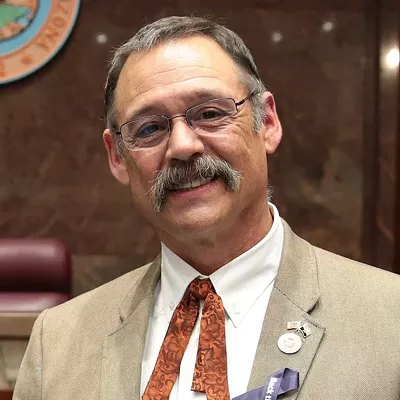Hired in 1991 by the county's Wastewater Department, Szalay suffered a work-related injury the following year, a condition he says grew progressively worse and resulted in his taking a long-term leave of absence in 1994. While recovering at home, he received two-thirds of his normal pay.
At the same time, Szalay assisted the Republican Party during election season by serving on the county's Logic and Accuracy Board, which oversees balloting procedures. Concerned about what he saw, he reported problems in 1996; believing he was ignored, he then took the issue to the press.
"Pima County didn't like the fact I was critical of them," Szalay says. "It forced a number of changes."
County Administrator Chuck Huckelberry sees things differently. He labels Szalay's accusations as "not accurate."
"Employees of Pima County go to the press every day with things," Huckelberry says. "That's no problem. People have a First Amendment right to do that."
In late 1996, Annie Deering was given the daunting task of cleaning up the county's job retraining program. The program was intended to place injured employees back into productive work, and the 40 people enrolled in the program had been sitting at home, one for as long as 11 years. They were collecting benefits along with their salaries, and Pima County taxpayers were footing the bill.
"Chuck (Huckelberry) was outraged," Deering said in a deposition about the program before she took it over. "He went on vacation and saw an injured worker out playing on the beach in Mexico." Based on that, a goal was established to return these employees to the work force within 12 months.
Deering supervised the program for one year before being re-assigned, but Szalay was not placed in a new job during that time. Thus, when she returned to the position in 1999, he was still not working.
At Deering's suggestion, Szalay passed tests for a clerical position he could physically handle. She wanted to place him in the job, but was instructed to do something different.
Her boss, she says, inferred that Huckelberry thought Szalay had been "a pain" during elections. Thus, Szalay was to be placed in a short-term special property inventory project under Deering's supervision.
Szalay cites several cases of harassment during his eight months on the job. Fearing Szalay might look at confidential workman's compensation records, Deering's boss ordered that Szalay be singled out and restricted to only half of the office. "After a while, it got a little ridiculous," Deering recalls. "He would have to come to me if he wanted a cup of coffee, then I would have to go over and get the cup of coffee."
More seriously, a fellow employee accused Szalay of coming to work after smoking marijuana. He vehemently denied the allegation, saying he had eaten Italian food for lunch, and demanded to be tested, a request that was denied.
Deering found Szalay to be an excellent employee. But Szalay believes he uncovered things in the property inventory concerning county leases and building-code violations that he wasn't supposed to.
While Szalay was still working on the project, the county administrator's office recommended Szalay be given another job, one that would be "unclassified." Unlike his previous employment, which carried Civil Service protections, this new assignment would expose him to termination without the opportunity to appeal.
"I got a job offer with a large pay increase to the Capital Improvement Program Section," Szalay remembers, labeling it a "take it or leave it" situation. He insists he was never shown a job description, and the man who was to be his boss said in a deposition that he didn't want Szalay because "of a lack of work."
The job entailed computer programming and repair responsibilities that Szalay was not qualified to perform. Because of that, he took some classes, which were paid for through a State of Arizona program that was intended to lead to permanent placement.
Despite that, in October 2000, Szalay was fired from his job, due--according to the county--to a lack of funding. No longer covered by Civil Service rules, he was forced to turn to the legal system, and filed suit against the county in 2002 seeking substantial monetary compensation.
In response, Deputy County Attorney Leslie Lynch denies all of Szalay's legal allegations. In a letter to the U.S. District Court, she wrote that Szalay "cannot prove that adverse action was taken against him ..." and reiterated that he was terminated simply due to a shortage of funding.
After he gives his deposition in the case, Szalay and his attorney, Edward Morgan, will evaluate his chances. Since being laid off, he has had some work; he also married Annie Deering more than two years ago.
Based on his experience, Szalay says his advice for current Pima County employees is to "keep records during your employment in case illegal actions are taken against you." He continues, "They should only work for the county until qualified to work elsewhere. The county isn't conducive to career opportunities."
For his part, Huckelberry insists that county employees don't have to be concerned about speaking out about what they see happening on the job.
"No one needs to be intimidated about it," he says. "Retaliation (by county officials) is illegal and not allowed."










